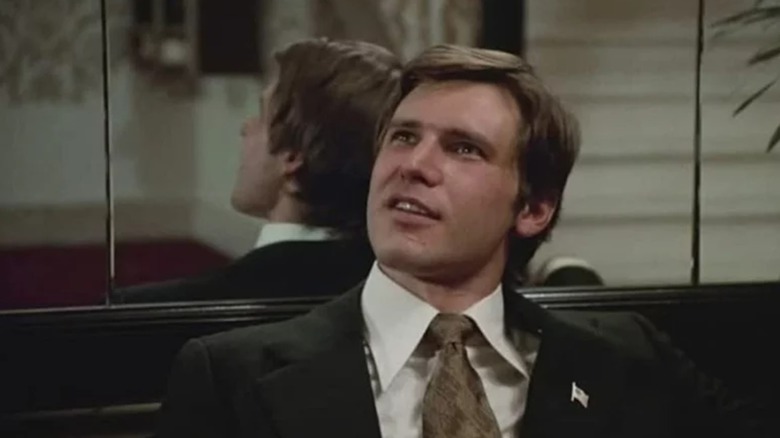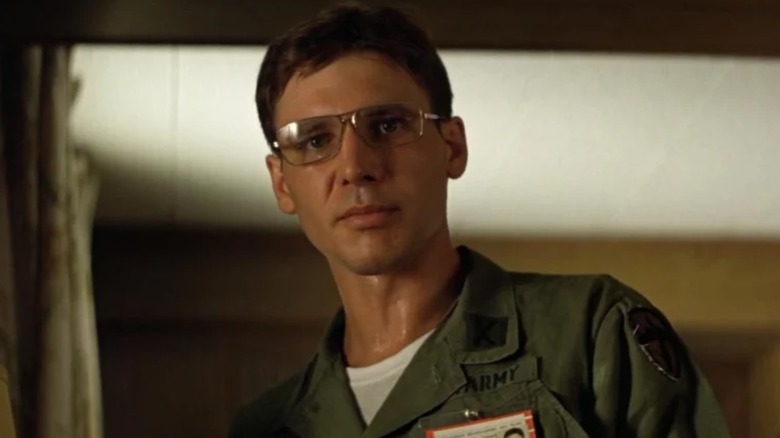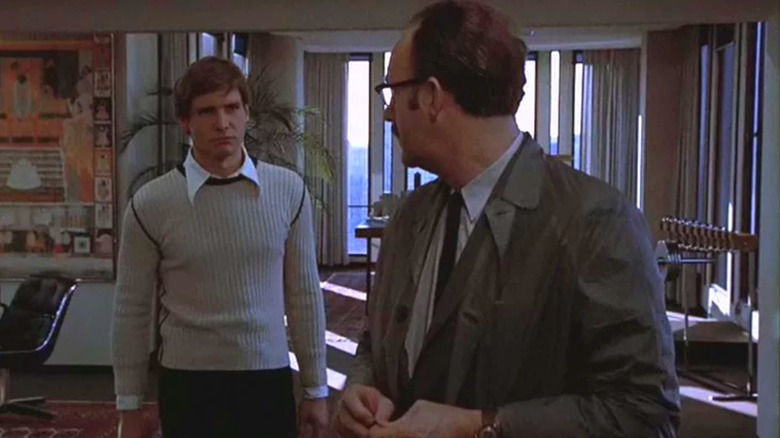The Two Highest Rated Harrison Ford Movies On Rotten Tomatoes Share The Same Director
With six decades of acting under his belt, Harrison Ford has made works that have run the gamut of critical responses. On Rotten Tomatoes, his most critically acclaimed role is listed as the "Apocalypse Now" making-of documentary "Hearts of Darkness," a film in which he ironically doesn't actually speak or appear but which nonetheless earned universal acclaim from the review-tabulating site. His lowest-rated film? An already-forgotten 2013 thriller called "Paranoia," which just 7% of critics included on the aggregation site wrote positively about.
Many of Ford's most entertaining films lie somewhere in the middle of that wide range; they're crowd-pleasing blockbusters and cult favorites with some endearing — and in the best cases, now legendary — imperfections. Ask fans what their favorite Ford-starring films are and you'll get a smorgasbord of answers that fit in this category, from "Star Wars" to "Indiana Jones" to "Blade Runner" to "The Fugitive." When it comes to movies that earned the most unanimous praise among professional film writers of their day, though, it's two early entries into Ford's filmography that stand out: "The Conversation" and "Apocalypse Now."
The Conversation and Apocalypse Now earned near-universal acclaim
Ford was still five years out from the release of mega-hit "Star Wars" when he began filming on "The Conversation," the Gene Hackman-led neo-noir in which he played the assistant to a shadowy man known as The Director. The movie hit theaters in 1974, earning praise from nearly every movie critic who seems to have reviewed it. It wasn't Ford but star Hackman who got most of the praise at the time. In his four-star review, Roger Ebert wrote that "As he is played by Gene Hackman in 'The Conversation,' an expert wiretapper named Harry Caul is one of the most affecting and tragic characters in the movies." In the book "Hollywood Incoherent," Todd Berliner noted that the movie ended up in the top 10 lists of many of the 25 critics he tabulated from the year of its release. "The Conversation" also ended up with three Oscar nods, for sound, writing, and Best Picture.
Five years after that film hit theaters, its director, Francis Ford Coppola, finally birthed the masterpiece he'd been toiling with for years: "Apocalypse Now." Ford shows up in that film as a man named Colonel G. Lucas, whose name was a direct nod to George Lucas (Lucas co-founded the production company American Zoetrope with Coppola, and directed Ford in "American Graffiti" before casting him in "Star Wars"). In this hellish, sprawling vision of the Vietnam War, the colonel appears only in a briefing scene early on, though /Film's Drew Tinnen wrote that he "really is convincing as a war-weary soldier forced to order Capt. Willard to hunt down and silence Marlon Brando's unhinged Colonel Kurtz." The film earned eight Oscar nods and won two trophies, for sound and cinematography.
Ford made these small parts unforgettable
Both "The Conversation" and "Apocalypse Now" hold an impressive 97% rating on Rotten Tomatoes (the highest ratings of Ford's career), and while critical consensus isn't everything, both movies are rightfully considered masterpieces. Ford is only a small part of each, but it's easy to imagine that his appearances in Coppola's films no doubt bolstered his reputation as an actor making great career moves. For his part, the actor said his low-profile appearances in the films were actually a bit of a hindrance, as he was a bit unrecognizable in the roles. In 2019 he told Empire:
That was a bit of a problem for me at the beginning of my career – the problem of identification. In 'The Conversation' I played a character who was gay, so nobody recognised me from 'American Graffiti.' When I did 'Apocalypse Now,' after 'Star Wars,' I played an intelligence officer of the American army. George Lucas saw the footage I had done and didn't recognise me until halfway through the scene.
According to Brad Duke's book "Harrison Ford: The Films," Ford often imagined inner lives for these smaller roles, and he actually pitched Coppola on the idea that his character in "The Conversation" should be gay after arriving on set. While it's ironic that the seasoned actor's most acclaimed films are ones in which he only briefly appeared, it's clear that he worked hard on them, that Coppola's magic touch made them indelible, and that they paved the way for Ford's eventual breakthrough. Still, I'd like a word with whoever gave "Blade Runner" a bad review.


